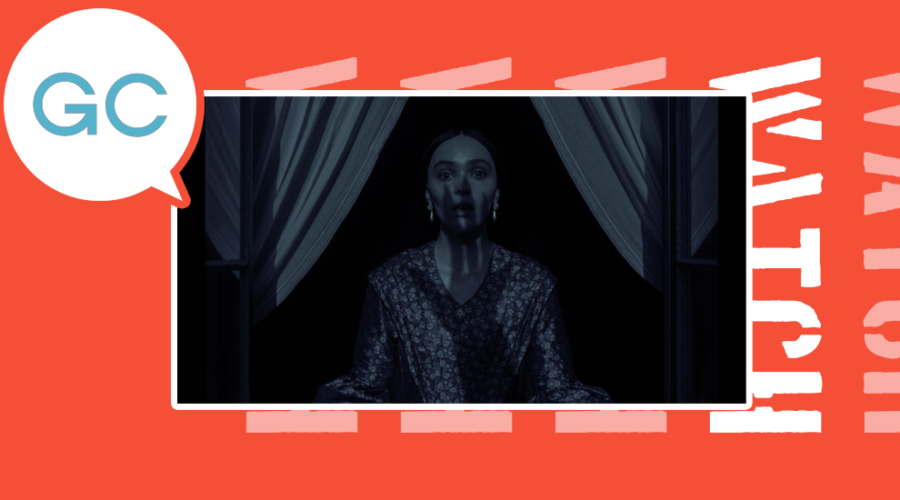Nosferatu wants to know where our prayers go when they have been cast into the ether. Do they rise before whatever gods we worship to join that vast and everlasting memorial, the eternal inbox, some more worthy than others of being answered? Do they flitter from pillar to post, discarded and downtrodden, never to be heard, skulking in the shadowy corners of some far-off heaven, trampled by the weight of human frailty? Or do some sail deep into the cosmos, perilously close to the Siren’s shore, to be snatched and perverted by the inevitable and indescribable evil harboured there?
Lily-Rose Depp as Ellen suffers from a deep melancholy, perhaps the age of enlightenment disagrees with her poetic soul. Joan of Arc-like via that Carl Theodor Dreyer close-up, she utters a tearful plea into the night for, “a guardian angel, a spirit of comfort… anything.”
Is it any wonder a prayer offered out of desperation from a Lutheran window is seized upon so readily by the long undead Count Orlock? The buried evil dampened by science and forgotten by secular reason has a chance to rise, to clamp itself like a bubonic parasite to those old-world traditions and sensibilities Ellen has unwittingly unleashed.
Once the veil has thinned, Orlock’s moustachioed corpse scrapes its way through the astral plane, ravishing Ellen with skeletal ease, her purrs and whispers, sensual and orgasmic are lost to his guttural tones, an ancient Carpathian obscenity, how an abomination would speak when no airflow comes from their necrotic lungs. How Orlock’s voice is formed is another horrific mystery lost to time but, once heard, the sound is reminiscent of flaying knives slowly being drawn up inside his throat to vomit up enough speed for the approximation of human speech.
Ellen’s tumultuous night terrors are somewhat calmed when she marries a junior estate agent, Thomas Hutter, an earnest and deeply respectful young man. However, as his eccentric employer Herr Knock states, “a new husband requires new wages” and Ellen fears her trauma will start again as Thomas must travel to Transylvania to have Count Orlock sign the deeds to a mansion in their home city of Wisborg.
Experiencing Nosferatu is akin to inhabiting the souls of the characters
Later Orlock will tell the petrified Thomas, with a mortician’s glee, that vampires don’t exist: “I look forward to retiring to your city of a modern mind who knows nothing of or believes of any such morbid fairy tales.”
Orlock longs for a world that has forgotten his wickedness as the Romani peasants keep him at bay with their iron stakes and rituals, and the nuns who later save Thomas and nurse him back to health are strengthened and fortified through their faith and belief in God and their knowledge that the devil is very real. Orlock’s bleak darkness will prosper in the heart of enlightenment as there will be no-one to counter him. Science has made heretics and madmen out of radical thinkers, men like Professor Albin Eberhart Von Franz, shunned for his knowledge of alchemy and mystic philosophy is the last hope when Ellen’s malady continues to worsen, her body convulsing and contorting like in The Entity.
Director Robert Eggers has fashioned a truly immersive period piece; there is no escape from his brutal chocolate box aesthetic, the realism renders the uncanny elements unerringly believable. There are no nods and winks from the uniformly excellent cast, no twirling of those exquisite moustaches or beards, no glints in their eyes, not even from Willem Dafoe’s deranged Von Franz.
Nosferatu is a forensic 19th Century procedural into the abject horror of its narrative. There is little romance to be found in the coffins of infants, or dried husks of plague victims. The manners of polite society, “good fellow, dear friend” are redundant in the world of Nosferatu.
Experiencing Nosferatu is akin to inhabiting the souls of the characters; we are bound to them for those dreaded two hours, in thrall to Depp and Dafoe, Bill Skarsgård as Orlock, Nicholas Hoult as Thomas Hutter, Aaron Taylor-Johnson as Friedrich Harding, Emma Corrin as Anna Harding, Ralph Ineson as Dr. Wilhelm Sievers, and Simon McBurney demented as Herr Knock.
Perhaps we are more like Ellen than we care to realise when she recounts one of her horrific dreams, “I’d never been so happy in that moment as I held hands with death.”

